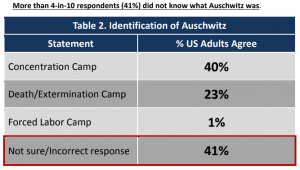In February of this year, the Conference on Jewish Material Claims against Germany hired Schoen Consulting to conduct a survey of American adults to determine how much knowledge America has on the Holocaust.
Several news sources have since published stories shocked and appalled by the numbers the study provided. “41% of Americans have to ask, ‘What’s Auschwitz’” a WQAD headline read.
This is a shocking statistic, but that’s what seems to be the problem with it. News stories such as these are written in a style meant to be understood by the general public. A headline like the WQAD one above assumes the general public knows what Auschwitz is, but the survey they’re reporting on says otherwise. Either the news station or the survey then must be wrong.
I tracked down the study to try and see for myself if the data was being misread. Instead of having this confusion cleared up, I found myself more uncertain than I was before.
Instead of providing the specific questions survey participants were asked, the data summary gave only a chart that was unclear on how their conclusions were drawn.

Based on this chart, it could be that Americans just didn’t know what type of camp Auschwitz was based on a multiple choice question. Or perhaps Americans were required to fill in an answer and couldn’t come up with the right one. This data can’t be understood by an outside observer without knowing what type of questions were asked.
Someone who probably would know what questions were asked would be the owner of the company that conducted the survey. Doug Schoen, owner of Schoen Consulting and contributor to Forbes online, published a story headlined “Encouraging findings from the 2018 Holocaust knowledge and awareness study.”
Schoen goes on to write about how Americans should be proud that the majority of Americans are aware of the vital lessons to be gained from the Holocaust. “Encouragingly,” Schoen said, “Our findings reveal that most Americans are aware that The Holocaust occurred, understand the significance of Holocaust education and knowledge, and support further enhancing such.”
Schoen agreed that some data was discouraging, including that Americans didn’t know the specific names of ghettos and camps, but overall he believed there was no reason to doubt that Americans have a high awareness of the Holocaust and its troubles. The data even showed that Americans have a high desire for increased Holocaust education.
Shocking data like the originally published statistics should not simply be believed. There is always the potential for something underneath the numbers that could tell an entirely different story.
The Holocaust was arguably the lowest point in modern history, and Americans know that. Just because your neighbor might not know the name of the place that several million Jews were murdered does not mean they don’t know that the crime was committed.
Categories:
The Holocaust is not being forgotten
April 26, 2018
0
More to Discover








































































































